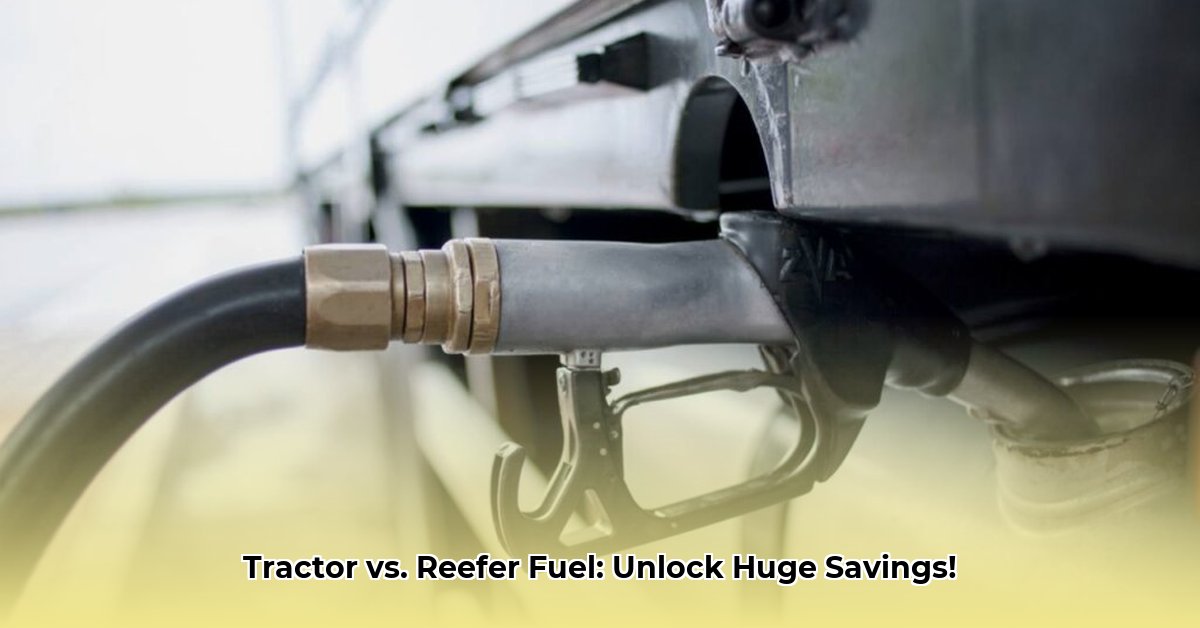
Difference Between Tractor and Reefer Fuel: A Guide for Fleet Managers
Running a trucking fleet requires careful management of numerous factors, with fuel costs being a significant contributor to overall expenses. While both tractors and reefers utilize diesel fuel, understanding the crucial distinctions between the fuel types used for each is paramount for maximizing savings and ensuring legal compliance. Failing to differentiate can lead to substantial financial penalties and operational inefficiencies. For more detailed information, see this helpful guide on fuel types.
Why the Distinction Matters: Financial and Legal Implications
The primary difference lies in taxation. Tractor fuel, used to power the main truck engine, is subject to both federal and state road taxes, significantly increasing its cost. This is because it's considered "on-road" fuel. Reefer fuel, specifically for powering refrigeration units in trailers, is generally tax-exempt. It's categorized as "off-road" fuel, avoiding these hefty taxes. This cost differential can amount to thousands of dollars annually for large fleets. However, improper use of reefer fuel—such as using it in a tractor on public roads—is illegal and results in substantial fines.
Chemical Composition and Visual Identification
While both fuels are fundamentally diesel, reefer fuel often includes specialized additives. These additives enhance its performance in cold temperatures and ensure the fuel's stability within the reefer unit's system. This improves the reliability of the refrigeration unit and keeps your goods at optimal temperatures. Another key difference is the color: reefer fuel is typically dyed red for easy identification. This red dye helps distinguish it from on-road diesel and aids in preventing unlawful use.
Navigating the Tax Landscape: A Cost Comparison
The tax burden is the most significant factor influencing the cost difference. A simple example illustrates this:
| Fuel Type | Base Cost per Gallon | Road Taxes per Gallon | Total Cost per Gallon |
|---|---|---|---|
| Tractor Fuel | $3.50 | $0.75 | $4.25 |
| Reefer Fuel | $3.50 | $0.00 | $3.50 |
Note: These are illustrative figures. Actual prices vary by location, season, and market conditions.
This simple comparison shows the considerable potential for savings when using reefer fuel correctly. However, these savings are conditional on strict adherence to regulations.
Fueling Your Fleet: Best Practices
To avoid costly errors and legal ramifications, unfailingly follow the guidelines below:
Tractor Units: Use only road-legal, taxed diesel fuel. This is essential for on-road operation and legal compliance.
Reefer Units: Use exclusively off-road diesel fuel designated for refrigeration units. Strict adherence to this rule avoids penalties and ensures your refrigeration system's optimal performance.
Using the incorrect fuel can not only result in fines but also cause engine damage, leading to costly repairs that far exceed any potential savings.
How to Optimize Fuel Efficiency and Minimize Costs
Effective fuel management goes beyond simply choosing the right fuel; it involves a multifaceted approach to minimize expenses and enhance long-term profitability.
Key Strategies for Long-Term Fuel Efficiency
To thoroughly compare the long-term fuel efficiency between reefer and tractor diesel, consider the following:
Comprehensive Fuel Cost Tracking: Monitor fuel prices for both types over time. Include any penalties incurred from improper fuel use in your calculations.
Detailed Consumption Monitoring: Track fuel consumption for both tractors and reefers. Remember that reefers generally consume more fuel due to the refrigeration system's continuous operation, and idle time significantly impacts fuel use.
Data Analysis for Consumption Per Mile: Analyze your data to calculate the average fuel consumption per mile for each vehicle type. Effective record-keeping is crucial for accurate analysis.
Maintenance Costs Assessment: Factor in potential maintenance costs. Reefer units, due to their added components, might incur higher maintenance expenses.
Regulatory Compliance: The potential for fines due to non-compliance is a substantial factor impacting the overall cost analysis.
By carefully considering these aspects, you can build a comprehensive overview of your fuel costs and implement plans to optimize your fuel efficiency.
Maximizing Fuel Efficiency Strategies
Invest in Fuel Management Systems: Real-time fuel consumption monitoring enables early detection and resolution of inefficiencies.
Comprehensive Driver Training: Enhance drivers' fuel efficiency through focused training on optimal driving techniques.
Preventive Maintenance: Regular vehicle maintenance ensures optimal engine performance, leading to reduced fuel consumption.
Negotiate Fuel Prices: Negotiating favorable pricing with fuel suppliers can generate significant savings over time.
Non-Compliance Penalties
Using off-road, dyed diesel fuel in on-road vehicles can lead to significant penalties, potentially reaching $10,000 per violation. Strict adherence to regulations is not merely a best practice; it is essential for maintaining your business's financial stability.
Core Insights:
- The significant cost difference between taxed tractor fuel and tax-exempt reefer fuel presents substantial savings potential.
- Misuse of reefer fuel leads to heavy fines.
- Effective fuel management requires a multifaceted strategy involving monitoring, training, and preventive maintenance.
By implementing these strategies and understanding the critical differences between tractor and reefer fuel, fleet managers can effectively minimize fuel costs, enhance efficiency, and ensure legal compliance, ultimately strengthening their businesses' profitability and stability.